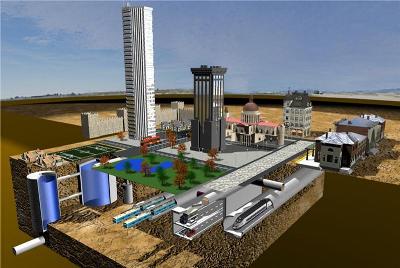Oct 20 2009
The vision of a city without cars in which particulate matter and noise has been banished underground and whose parks are green oases of recreation for its citizens was the vision at the start of the project.
In the framework of TUNCONSTRUCT (Technology Innovation in Underground Construction), 41 partners from 11 countries developed new ideas and prototypes ready for use under the lead management of the Institute for Structural Analysis of Graz University of Technology. Among a range of achievements, a new simulation tool for tunnel engineering was developed, tunnelling machinery improved and a system for monitoring the construction phase using fibre optic cable was designed. Researchers will celebrate the final event of the four-year project in the Graz Dom im Berg, tomorrow on 20 October 2009.
 A vision on its way to reality: The traffic moves under the earth, on the surface area there are parks for the people
A vision on its way to reality: The traffic moves under the earth, on the surface area there are parks for the people
"To save time and costs in construction and at the same time to minimise risks in the construction phase in order to increase the quality of life of European citizens as an end result", remarked Gernot Beer of the Institute for Structural Analysis of Graz University of Technology as he summarised the aims of the TUNCONSTRUCT project. The researchers have achieved success in many areas, with the result that now at the end of the project there are a number of prototypes on the application threshold.
Innovations from virtual reality to robotics
Prof. Beer and his team, who were responsible for the co-ordination of the large-scale project, developed a user-friendly simulation tool for tunnel engineering. And research colleagues from France measured earth subsidence using fibre optic cable, thus improving safety of the construction phase. Robots will be increasingly used for maintenance work in tunnels. This means that tunnels will not have to be closed down and traffic flow can continue unhindered. And there are new findings regarding the optimisation of construction machinery.
Graz as a European tunnel engineering competence centre
It was the best of all possible projects, which structural analyst Gernot Beer co-ordinated for four years. "TUNCONSTRUCT was the world’s biggest research project on underground construction – not just with regard to the number of partners but also with regard to the project budget ", summed up Beer. Partners from a total of eleven EU countries participated in the research initiative with a project volume of about 26 million euros.
Source: http://www.utp.edu.my/